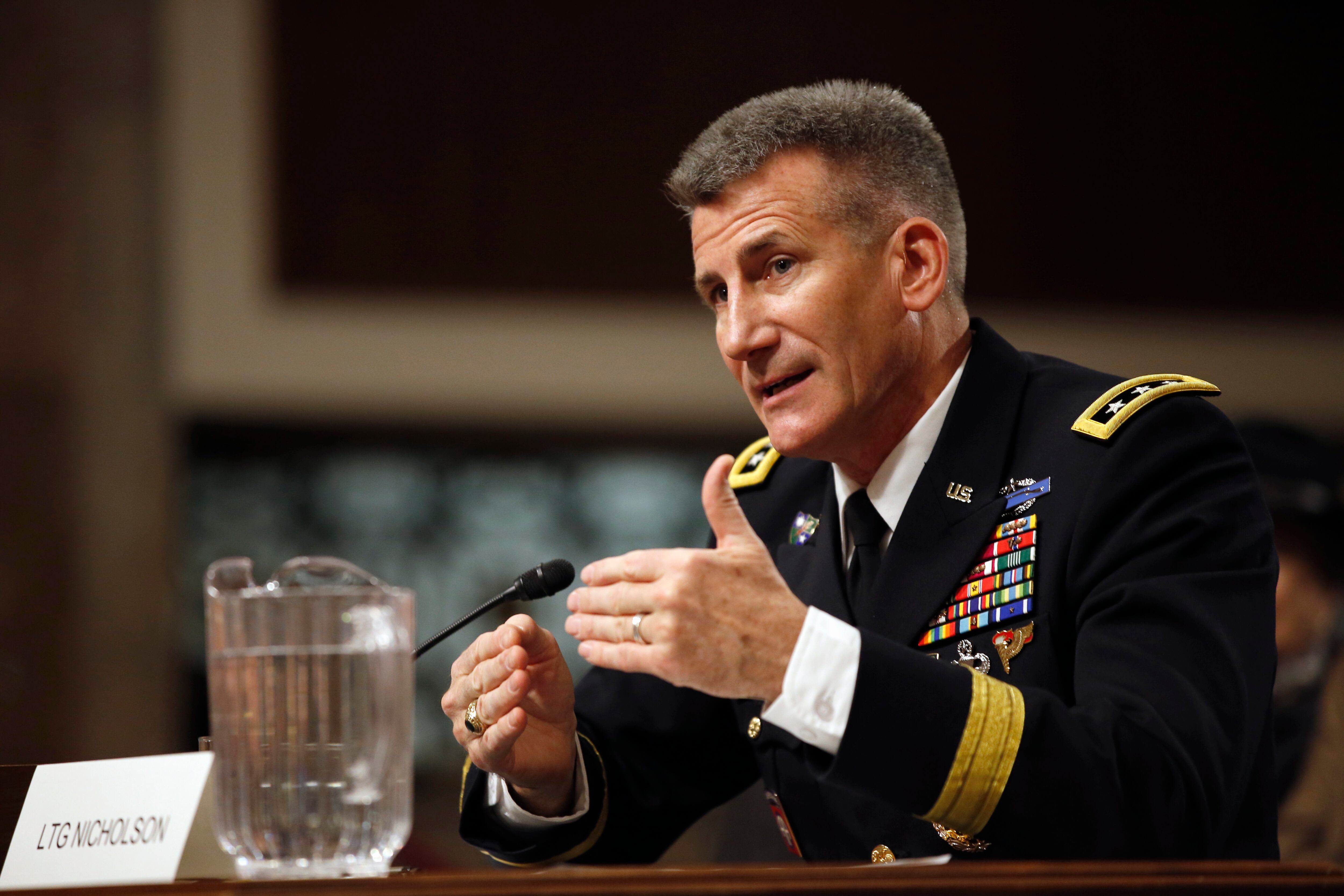WASHINGTON -- The head of U.S. forces in Afghanistan on Thursday told lawmakers he needs several thousand more troops to break the "stalemate" in the fight against terrorist groups in that country.
Gen. John Nicholson Jr.,commander of United States Forces Afghanistan, said those additional forces could either be U.S. servicemembers or other coalition allies, and would enable more advising and training of Afghan troops "below the corps level."
The new forces would not be for counter-terrorism efforts and direct missions against terrorist cells, but Nicholson said the training work is key to ensuring the long-term sustainability of the still struggling Afghanistan military.
"The current security situation in Afghanistan is a stalemate where the equilibrium favors the government," he said in his statement to members of the Senate Armed Services Committee. "Leadership and countering corruption are two areas in which the (country's security forces) must improve to reduce casualties and increase military capability."
Nicholson said the decision to deploy a 300-person task force of U.S. Marines to southwestern Afghanistan this spring will help local security forces regain progress there, but is only one step in helping build up their confidence and capabilities.
The comments came as lawmakers await President Trump's long-term plan for the 15-year-old war, and as lawmakers continue to spar over former President Barack Obama's strategy there.
About 8,500 U.S. troops and another 5,000 troops from foreign allies are still stationed in Afghanistan, even though the official combat mission there ended in 2014.
Committee Chairman Sen. John McCain, R-Ariz., said recent decisions on force levels and involvement have "tied the hands of our military in Afghanistan" and endangered both deployed troops lives and U.S. national security.
"Instead of trying to win, we settled for just trying not to lose," he said. "Time and time again, we saw troop withdrawals that seemed to have a lot more to do with American politics than conditions on the ground in Afghanistan…
"Afghans are in the fight. They are not looking to us or anyone else to do their fighting for them. At the same time, they want and need our continued assistance: It is in our interest to help our Afghan partners become capable of standing on their own."
Committee ranking member Sen. Jack Reed, D-R.I., countered that Obama’s plans were responsible and well thought out but noted that "an over-reliance on (Afghanistan special forces) is resulting in an unsustainable operational tempo and level of casualties."
Nicholson did not ask for more troops to help directly with that problem, but said better trained conventional forces could take pressure off those specialized units. Even though the Afghan National Army numbers more than 350,000 troops, the military’s 17,000 special forces personnel conducted 70 percent of all offensive operations in 2016.
For now, U.S. officials are using outside contractors to help plug manning shortfalls in the advise and assist mission.
Nicholson also said that he believes if U.S. forces were to pull out of the country completely, it could result in new terrorist attacks against the American homeland.
"We need to stay on top of it, because of the confluence of 20 different terrorist groups in the region," he said. "I believe this is an enduring commitment."
Whether Trump and his military advisers share that same idea remains to be seen. Trump infrequently discussed the ongoing conflict in Afghanistan on the campaign trail, and has not addressed American’s longest military conflict since taking over as commander in chief.
He has expressed a desire to pull back U.S. forces from ongoing conflicts with marginal benefits for the American public, but has also promised to aggressively go after potential adversaries to limit the chances of terrorist attacks at home.
Nicholson said Defense Secretary James Mattis is scheduled to visit Afghanistan in coming weeks, to get a better sense of successes and challenges there.
In addition, officials are developing plans to "find success" in Afghanistan within next four years, a timeline that could take American involvement in the conflict into its 20th year.
Nearly 2,400 U.S. troops have been killed in fighting in Afghanistan since 2001. Follow @LeoShane
Leo Shane III covers Congress, Veterans Affairs and the White House for Military Times. He can be reached at lshane@militarytimes.com.
Leo covers Congress, Veterans Affairs and the White House for Military Times. He has covered Washington, D.C. since 2004, focusing on military personnel and veterans policies. His work has earned numerous honors, including a 2009 Polk award, a 2010 National Headliner Award, the IAVA Leadership in Journalism award and the VFW News Media award.





